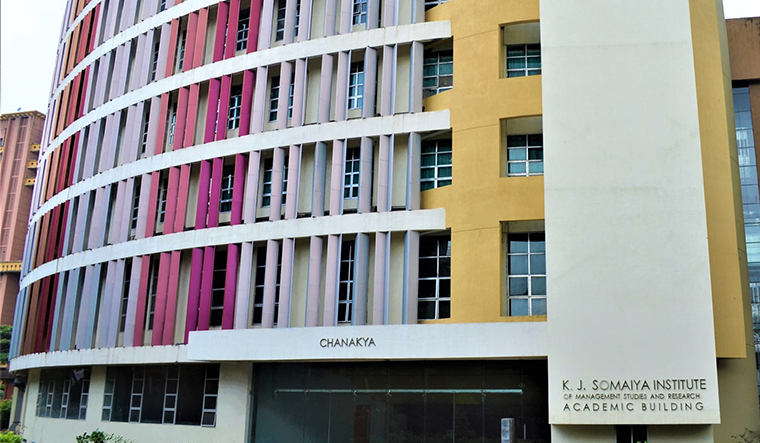The pandemic was an unprecedented event. How do you prepare students at K J Somaiya Institute of Management to deal with such a situation when they go on to work as managers?
The manner in which the lockdown due to global pandemic was handled by our Institute has made the students appreciate the value of resilience, agility and adaptability under uncertain conditions. A lot of thought and preparation went into ensuring that there was no disruption in our academic schedule. The students were issued e-books and other reading material as per their requirements. All the institute activities, including those of the 30 student bodies, have been conducted online. A lot of learning happens by observation – and our students have observed how the institute management, faculty, staff and students got together as one team to keep the activities moving. This itself is such a big learning for the students and they will remember this always as they embark on their corporate careers.
What are the skills which are most important for the new-age manager?
As technology takes over most functions, the difference that can be created is through collaboration and creativity. It is proven beyond doubt that it is only teams which are in sync with the ultimate objective, can deliver. The ability to work in teams with courage, conviction and confidence – whether online or in the real world – together with understanding of technology tools, willingness to learn and go beyond the call of duty for the requirements of the job – are the skills that are most important for the new-age manager.
Activities such as industry visits and rural sensitization camps are an important part of the learning process. How did you replace such experiences during the pandemic?
We conduct an experiential learning activity called Ankur ELI which focuses on learning by doing - a course elective where Gujarati vernacular medium students from the underprivileged society are taught English & Communication. The initiative used to be an offline activity till last year, with this pandemic it has undergone a transformation. This year, these school children are being taught online via WhatsApp & Google classroom. The duration has reduced but the number of sessions has increased. The pedagogy used is videos & exercises centered around homes. Use of technology has helped tremendously, allowing our student mentors come up with creative solutions to engage the school children.
What was the impact of COVID-19 on the placement process and how did you deal with it?
AICTE had issued an advisory for internships to be done in virtual mode. Many organizations rescinded or deferred summer internships of the students. However, the Career Management & Corporate Relations Cell at the institute started looking for newer opportunities for students. With the extensive network of our Alumni Connect, students got live projects/internships. Almost 98% of the students were successful in completing summer internships in virtual mode. As an alternative for the remaining 2% of the students, the institute proposed that first-year students be evaluated based on certification course completion on Coursera. For final placements, 165 recruiters visited our Campus and 39 new recruiters were added to the pool for final placements. The average salary of Top 100 Offers for the Batch PGDM 2018-2020 was Rs. 13.25 lakhs and the highest salary: Rs. 28.50 lakhs per annum. So far, around 80% of the students have been onboarded by the various companies and hopefully all our students from the Batch 2018-20 will get onboarded by December 2020.
Have you made any major changes to the curriculum because of the pandemic? If so, what are the new things you have included?
The institute management took a call to switch to work from home and e-learning mode after the lockdown started from mid March 2020. The institute also decided to evaluate the students on internal assessments through different methodologies. Group presentations were converted into practical work from home assignments. Pedagogy was simplified so that the students could understand the concepts without the physical presence of a faculty. A Digital Transformation Committee was created to train faculty and staff members as most of the activities were happening on digital platforms. The institute virtually hosted international delegates and diplomats for guest talks on international relations and diplomacy. There was a seamless transition from offline to online of the institute.
Going forward, which specializations do you think will be most relevant for management students?
All specializations will remain relevant but with a very strong infusion of technology into their processes. The new emerging areas of Analytics and Data Science will enable the process of digitization of all specializations. The education industry itself is ready for a major upheaval and infusion of technology into its pedagogy and curriculum design.
What are the major improvements needed in management education in India?
Management education must be in sync or one step ahead of industry requirements. Industry 4.0 in turn has to deliver to a society that has become acutely aware of its obligations to environment and sustainability issues. The coordination and collaboration between academia, industry and community is the need of the hour. Experiential learning along with skillsets of technology, moving beyond the classroom boundary - will set the pace for a new era in management education. An appreciation of our culture and traditions, learnings from our scriptures – will pave the way for modern management principles based on our ancient philosophies. The best of the west combined with the best of our eastern philosophies will define the new management education.
By closely observing Industry 4.0, community requirements, what are the changes that are happening in the manner in which the businesses and society are conducting their business and lives, how the consumers are changing – these inputs will help in designing and delivering a new curriculum to make our students employable graduates.
What role does the government have to play to help b-schools improve?
The government should consider involving b-school students and faculty in their grass root improvement projects. There is a wealth of knowledge and enthusiasm among the b-school students and faculty – these must be tapped into to improve the various systems and processes. These will be great learning opportunities and inspire the students and faculty to come up with innovative ideas and solutions – thus giving rise to entrepreneurial opportunities too.




